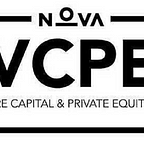A momentary snapshot of Diversity in Venture Capital
Despite years of efforts to increase diversity in the venture capital (“VC”) industry, a significant gender gap remains among general partners at venture capital firms. It is widely recognized that improving diversity in the private capital industries is the right thing to do, but there is still no clear sign of change and female partners are still vastly underrepresented. In face of our upcoming event “Diversity in Entrepreneurship & Venture Capital” on the 28th of April, this article presents an overview of the status-quo of diversity in VC.
Women account for only a small part of general partners at VC firms across the world. For instance, only 13%, 10% and 6% of decisions are made by women in British, US and Dutch VC firms respectively. There are two major questions associated with this gender gap. The first question is about the origin of the gap and how this inequality can and should be addressed. The second relates to the implications for respective VC firms and the entire industry itself.
In fact, female investors have invested less money than men into VC firms in the past. This can be partly explained by the lower proportion of wealth and the fact that females actively invest less. However, the share of women’s wealth rose considerably in the 20th century and the limitation of risky investments is often due to financial advisors that underestimate women’s appetite to risk. An overrepresentation of male investors is one reason for a partner composition that mostly consists of male decision-makers.
To understand the implications of a gender gap among decision-makers within VC firms, two major characteristics of female and male investors are important. First, VC firms are far more likely to partner with people if they share their gender or race, as they are also significantly more likely to collaborate with people if they share their educational background or a previous employer. This phenomenon is called homophily and even though the desire to associate with similar people can bring social benefits to those who exhibit it, it also leads investors to pass on some great deals. This led to an underinvestment of female founders in a VC industry where most decision-makers are men. Second, women invest more to make a clear measurable impact on society, not just to generate profit. For example, 33% of the 2017–2018 ImpactAsset 50 fund managers are female-led and 41% of the senior management team are women. VC firms are not a charity organization, and they promise investors a return on their capital, but Paul Gompers for example has found that diversity in VC firms significantly improves financial performance on measures such as profitable investments at the individual portfolio-company level and overall fund returns.
Venture Capital is funding the future and decisions made by VC firms impact the whole community. It is therefore important that the VC industry is free from biases. Diversification of decision-makers in VC firms opens a fantastic opportunity not only for female founders and sustainable companies to be even more recognized, but also to VC firms and their investors to increase financial performance. There are many projects with the aim of creating an industry free from biases. For example, Diversity VC, which is a non-profit partnership promoting diversity in VC by collaborating with entrepreneurs, investors and universities.
Disclaimer
This newsletter is fully independently produced by the members of the Nova Venture Capital and Private Equity Club. This club is run by students of the Nova School of Business and Economics.
You can access directly to the sources we used:
Diversity VC (2019). The questions LPs can ask for due diligence on diversity and inclusion in VC. Available at: https://www.diversity.vc/blog/the-questions-lps-can-ask-for-due-diligence-on-diversity-and-inclusion-in-vc/ [Accessed on April 21, 2021]
European Comission (2020). Gender Smart Financing Investing In & With Women: Opportunities for Europe. Available at: https://ec.europa.eu/info/sites/info/files/economy-finance/dp129_en.pd. [Accessed on April 21, 2021]
Harvard Business Review (2018): The Other Diversity Dividend. Available at: https://hbr.org/2018/07/the-other-diversity-dividend [Accessed on April 21, 2021]
Harvard Kennedy School (2019): Advancing Gender Equality in Venture Capital. Available at: https://wappp.hks.harvard.edu/venture-capital-and-entrepreneurship [Accessed on April 21, 2021]
